Leadership says that the State of Arizona would allow it only a single driving facility. The leadership then turned its focus to the Chino Valley Center where major improvements on developing a facility have recently been completed.
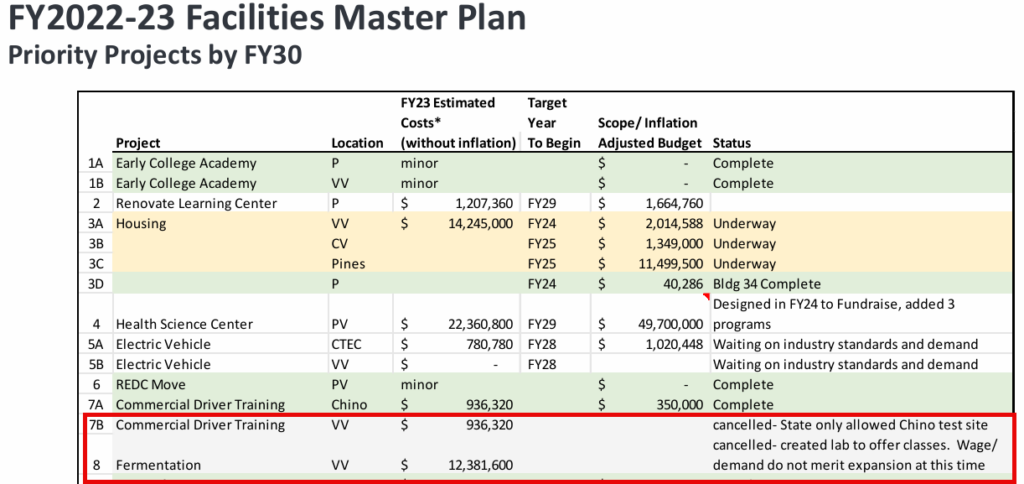

Yavapai Community College President Dr. Lisa Rhine informed the District Governing Board at its March meeting that the College had been named on of USA Today’s “Top Workplaces.” In a March 26 news release, the College explained that “The ‘Top Workplaces’ award recognizes more than 1,500 organizations with 150 or more employees that have created exceptional, people-first cultures. About 40,000 organizations were invited to participate.”
Winners are recognized for their commitment to fostering a workplace environment that values employee listening and engagement. Yavapai College was cited as an outstanding workplace among institutions with 500-999 employees.”
Dr. Rhine, in commenting on the award, said: “It is an honor to be recognized as a top workplace in the U.S. Our employees are the engine that powers what we do, and it is incredibly important that we build a culture that supports them. I am so proud of YC.”
Top Workplaces are determined by administering an employee engagement survey through Energage. Energage surveys employees at thousands of companies worldwide. The employee survey feedback is the sole criterion in determining the Top Workplaces. A full list of 2025 winners can be seen at:
https://www.usatoday.com/story/money/2025/03/20/best-places-to-work-2025-survey/77718021007/
The “Top Workplaces of 2025” citation comes a year after Yavapai College was named one of 2024’s “Top Workplaces in Arizona” by AZCentral, USA Today Network, and LocalIQ.
 On Thursday afternoon, February 6, 2025, members of the Yavapai Community College District Governing Board were notified via email that, due to unspecified “safety concerns,” future Board meetings would be held on Zoom. The notice stated that Chair McCasland “believes this will allow all meeting attendees, including the public, to participate in a safe setting.”
On Thursday afternoon, February 6, 2025, members of the Yavapai Community College District Governing Board were notified via email that, due to unspecified “safety concerns,” future Board meetings would be held on Zoom. The notice stated that Chair McCasland “believes this will allow all meeting attendees, including the public, to participate in a safe setting.”
McCasland provided no examples or further explanation for the abrupt and somewhat alarming decision. Third District Representative Toby Payne sent an email to Chair McCasland requesting clarification about the “safety concerns” that prompted the switch to Zoom meetings. So far, there has been no reply.
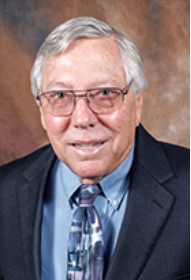
Representative Toby Payne
When questioned by the Blog about McCasland’s safety concerns, Payne indicated he was unaware of any. When asked if he had received any threats, he responded, “No.” He commented that he was concerned that the switch to the virtual format may interfere with communication during the meetings among Board members.
It is noteworthy that during the month of January the Governing Board has held two workshops with each lasting around six hours. There was no opportunity for the public to speak at either meeting. However, there were few, if any, members of the public present at either meeting.
(Email from Yvonne Sandoval, Executive Assistant to the President & District Governing Board)
Sent: Thursday, February 6, 2025 2:15 PM
Subject: Important Statement from Board Chair McCasland
“Good afternoon, Board Member,”
“Per Board Chair McCasland’s directive, letting you know that after learning of safety concerns related to our board meetings, she has decided that governing board meetings will be held virtually only until further notice. Meetings will be live-streamed and recorded in the same way governing board meetings were handled during pandemic closures. We will provide notice of this change to the public on our website, and the information will also be included on all meeting agendas. She believes that this will allow all meeting attendees, including the public, to participate in meetings in a safe setting.“
“Chair McCasland:
“Please explain to all the Board members what your “Safety Concerns” are that have prompted your switch to a Virtual Meeting for the Yavapai College Board. I believe this will hinder the free flow of discussion.”
Toby Payne
 It may have shocked some to learn that Yavapai Community College President Dr. Lisa Rhine has issued a chilling directive to staff, instructing them to never discuss college or community matters with a member of the District Governing Board. According to Dr. Rhine, even an innocent conversation with a Board member could lead to disciplinary action if it touches on something she considers and defines as “college operations.”
It may have shocked some to learn that Yavapai Community College President Dr. Lisa Rhine has issued a chilling directive to staff, instructing them to never discuss college or community matters with a member of the District Governing Board. According to Dr. Rhine, even an innocent conversation with a Board member could lead to disciplinary action if it touches on something she considers and defines as “college operations.”
Dr. Rhine revealed this authoritarian edict while supporting a provision in a District Governing Board policy resolution drafted by former college president and consultant Dr. David Borofsky. The resolution, which was under discussion, included a clause that was eventually approved in a 4-1 vote. The provision states: “Under no circumstances should an individual Board member direct or contact by any means, a staff member concerning a college or community issue.”
This poorly drafted provision effectively limits a Board member’s ability to seek information from any college source other than the president. The restriction, in the Blog’s view, clearly undermines the role of Board members, who are elected officials entrusted with representing the taxpayers of Yavapai County. It also reflects a profound distrust of the integrity of Board members.
Below is a video clip of Dr. Rhine’s comments, delivered to the Board at its November 21 meeting on the Prescott Campus.
 OPINION: The outgoing Yavapai Community College District Governing Board, with two lame-duck members, convened on November 21 at the Prescott Campus, where one of the major issues was a controversial resolution drafted by current consultant and former college president Dr. David Borofsky. The resolution’s main purpose appears aimed at stifling and controlling the free speech and behavior toward faculty and staff of elected Board members. As written, the resolution raises serious concerns about transparency and accountability.
OPINION: The outgoing Yavapai Community College District Governing Board, with two lame-duck members, convened on November 21 at the Prescott Campus, where one of the major issues was a controversial resolution drafted by current consultant and former college president Dr. David Borofsky. The resolution’s main purpose appears aimed at stifling and controlling the free speech and behavior toward faculty and staff of elected Board members. As written, the resolution raises serious concerns about transparency and accountability.
Dr. Borofsky’s professional history is deeply intertwined with Yavapai Community College leadership. He previously served as Interim Executive Director of the Arizona Association of Community College Trustees (AACCT), an organization that listed Yavapai Community College Board Chair Deb McCasland among its members. He is now the permanent Executive Director of a separate entity, the Arizona Community College Coordinating Council (ACCCC), which lists as a member Yavapai Community College President Dr. Lisa Rhine.
Notably, Borofsky’s tenure as a college leader has not been without controversy. For example, it was reported that at Dakota State University he unexpectedly resigned when students began organizing petitions “to then President Borofsky—who was primarily suspected for pressuring the changes in leadership—asking for answers to why these decisions were made.” The claim was that “several high profile administrators” had stepped down, and it “was believed by many students and faculty that these administrators had not stepped down willingly.”
It was also reported that Jack Warner, executive director of the Board of Regents, “managed to confirm a suspicion that students . . .held since the incident: Doctor Borofsky’s choice to leave was a quick development, and was certainly made because of the poorly received decisions.”
At the November Yavapai Community College Governing Board meeting, Third District Representative Toby Payne asked Chair McCasland who had initiated the request for Borofsky to draft the resolution. McCasland admitted she had done so.
The resolution presented by Borofsky to the Board, which was published in full in a November 16 blog post, is overall an extreme document designed to muzzle dissent and enforce rigid control over Board members. Among its provisions, it prohibits Board members from making any comments about the College president that could be construed as negative. Thus, the Third District representative Toby Payne, under this resolution, can never raise critical questions with his constituents about the lack of attention or development by the college leadership in his district. Even more troubling, the Resolution bans Board members from engaging with community college staff or faculty in any way on any issue involving the College or the community.
This resolution lays bare the administration’s profound fear of criticism and its desire to silence opposing voices. It exemplifies a culture of authoritarian control, where dissent is not tolerated, and open dialogue, some of which may be considered critical, is actively suppressed. Such measures are a blatant affront to the principles of governance and transparency that should guide a public institution.
In essence, the resolution reflects an unsettling effort to insulate the College leadership from accountability at the expense of the public’s trust. The five elected officials on the lame duck Governing Board should have resisted the blatant attempt to undermine their ability to represent their constituents and upheld their responsibility to advocate for transparency and fairness. Anything less is a disservice to the residents of Yavapai County who they are sworn to serve. Moreover, it is a disservice to democracy.
Unfortunately, the 4-1 vote cast by the lame duck representatives who approved this resolution at Tuesday ‘meeting does not reflect either these concerns or basic democratic values.
 Yavapai Community College pays $3,300 annually to participate in the Bellwether College Consortium, according to the organization’s website. This prestigious consortium recognizes outstanding and innovative programs among community colleges across the United States and its territories.
Yavapai Community College pays $3,300 annually to participate in the Bellwether College Consortium, according to the organization’s website. This prestigious consortium recognizes outstanding and innovative programs among community colleges across the United States and its territories.
Each year, 30 community colleges are selected as finalists for the Bellwether Awards, drawn from a large pool of applicants. The finalists are divided into three categories, with 10 colleges chosen in each of the following: Instructional Programs and Services, Planning, Governance, and Finance, and Workforce Development.
This year, Yavapai Community College earned a place among the 10 finalists in the category of Instructional Programs and Services. The college’s submission focused on the formation and implementation of its All-College Council, highlighting its commitment to collaboration and shared governance.
The Bellwether Award winners will be announced during the Community College Futures Assembly, scheduled for February 23–25, 2025, at the historic Menger Hotel in San Antonio, Texas.

Mayor Scott Jablow
Yavapai Community College appeared miffed, agitated, and offended by the audacity of being asked in a premeeting email to respond to specific questions regarding its operations at the upcoming October 9 Sedona City Council meeting. The questions, sent by Sedona Mayor Scott Jablow, seemed to strike a nerve. According to the College, its frustration and refusal to answer harken back to a previous encounter in September 2021, when a similar line of questioning allegedly provoked a strong reaction.
In an effort to assist Sedona/Verde Valley Dean Dr. Del Genio and Communications Director Richard Hernandez in preparing for their presentation, Mayor Jablow sent Hernandez a list of ten potential questions he might raise during the October 9 meeting. (See questions below.) Hernandez’s response, which came swiftly and could easily be interpreted as angry, frustrated, or even petulant, left little room for doubt. (See response below.)
In his correspondence, Hernandez bluntly informed the mayor that neither he nor Dr. Del Genio would attend the upcoming Council session. He made it clear that he was “not interested” in a repeat of the College’s last appearance before the Council in September 2021. Hernandez claimed that the Council’s behavior and questioning during that 2021 meeting were inappropriate for a public forum. He even suggested a private meeting involving only the mayor, the council, and select staff, raising concerns about whether this proposal was an attempt to bypass public scrutiny.
The College has yet to clarify whether Dr. Del Genio shares Hernandez’s position. All inquiries by the Blog for further information have been directed to the public relations department, which has a long-standing reputation for withholding information.
As of the latest update, Yavapai Community College has assigned Dr. Marylou Mercado, Vice President of Workforce Development & Health Sciences, and Dr. Doug Berry, the Provost, to represent the College at the October 9 Council meeting. Whether they will avoid answering the mayor’s questions remains to be seen.
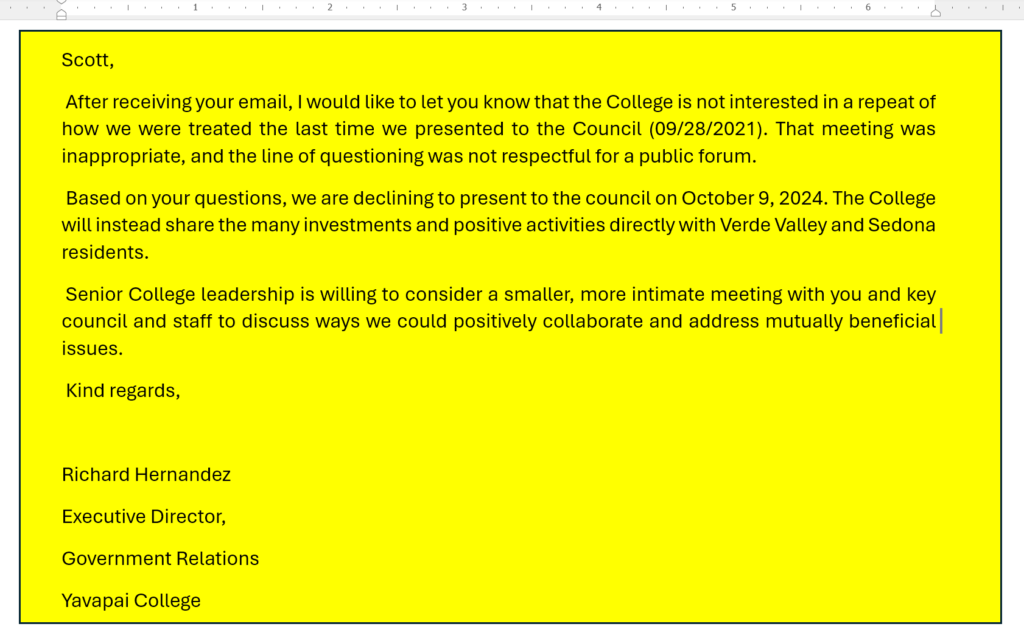

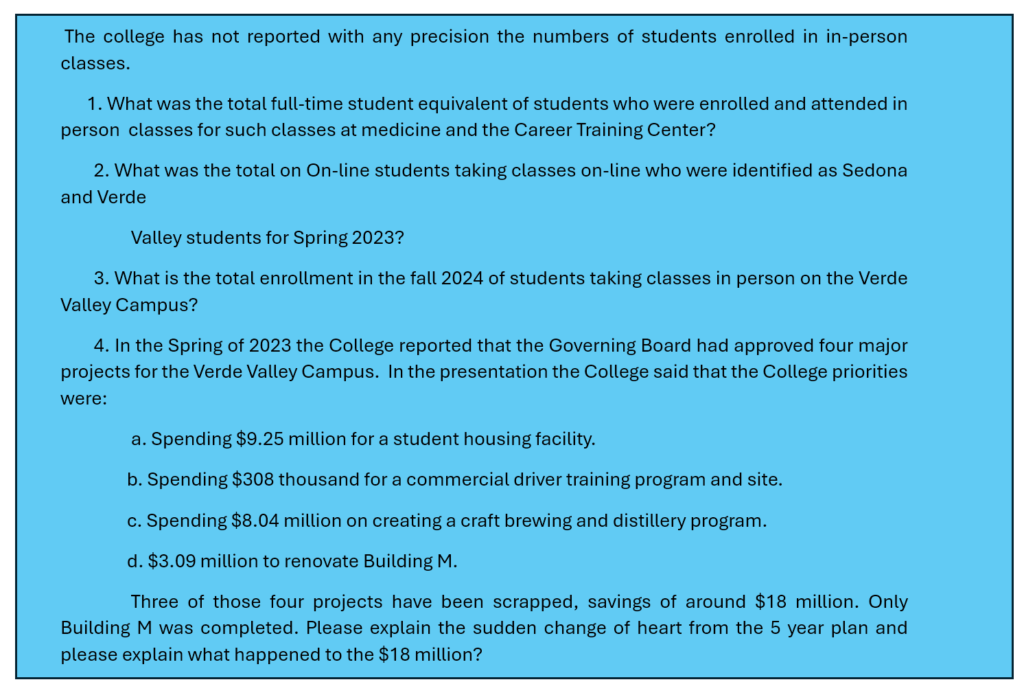
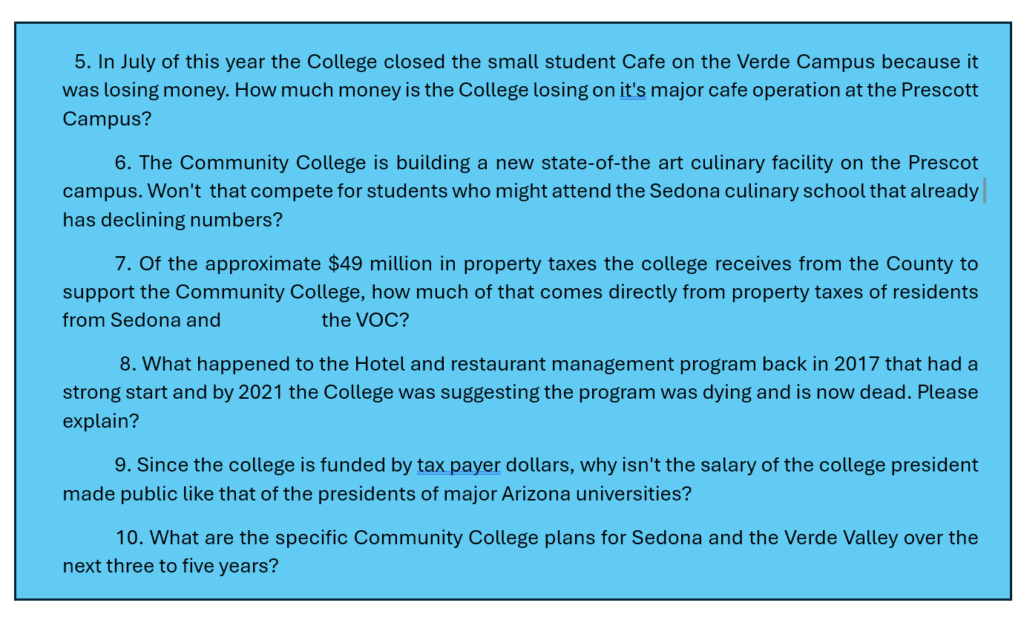
 The decision to close down the Student Café on the Verde Valley Campus was made by Yavapai Community College’s Prescott based Executive Leadership Team (ELT). The Yavapai Community College Sedona/Verde Valley Campus Dean is not formally included among this group of decision makers.
The decision to close down the Student Café on the Verde Valley Campus was made by Yavapai Community College’s Prescott based Executive Leadership Team (ELT). The Yavapai Community College Sedona/Verde Valley Campus Dean is not formally included among this group of decision makers.
The decision was apparently based on financial concerns. The Executives concluded that replacing the Verde Valley Campus Café with vending machines run by an outside company could generate more money that the Café run by one full-time and one half-time person. The outside company has already installed vending machines at CTEC, the Prescott Valley Center, and on the Prescott Campus. (The Prescott Campus vending machines are in addition to the Eatery seven day year round student Café operated there and are located apart from the Cafe.)
Kelly Foy was hired in 2022 as the manager and instructor for the Verde Valley Campus Café. In a press release from the time she was hired, the Community College quoted Foy as aiming at “creating the teaching restaurant for YC because she loves cooking, loves teaching and believes hands-on experience is invaluable for students. `I’m drawn to teaching that involves actually doing the work at the same time,” Kelley said adding, “I want to be part of the direction the college is going’ — that is providing life-lifting career opportunities for individuals and strengthening our local economy.”
Foy’s new assignment is that of catering manager for the Prescott Student café and Executive Chef District wide. The other employee will continue in job for the Community College as part-time non-credit culinary worker (a little unclear).
One of 22 organizations in the large company category to receive the award
 Yavapai Community College was one of 153 companies across Arizona that were identified by AZCentral, USA Today Network, and LocalIQ as top workplaces and one of 22 organizations in the “large company” category. The Community College accepted the award at the annual Top Workplaces awards gala in Glendale, Arizona , on June 27, 2024.
Yavapai Community College was one of 153 companies across Arizona that were identified by AZCentral, USA Today Network, and LocalIQ as top workplaces and one of 22 organizations in the “large company” category. The Community College accepted the award at the annual Top Workplaces awards gala in Glendale, Arizona , on June 27, 2024. In a recent press release, Yavapai Community College president Dr. Lisa Rhine reported on the Community College’s Virtual Reality pilot program. She explained that the College “piloted VR through a structured and experimental approach, involving multiple departments and classes, including 3D design, computer science, art history, CNC, construction, culinary, healthcare, HVAC, manufacturing and others. During the pilot year, more than 600 students participated in the VR programs, and 150 faculty members and 47 staff members were involved, along with 282 community members.”
In a recent press release, Yavapai Community College president Dr. Lisa Rhine reported on the Community College’s Virtual Reality pilot program. She explained that the College “piloted VR through a structured and experimental approach, involving multiple departments and classes, including 3D design, computer science, art history, CNC, construction, culinary, healthcare, HVAC, manufacturing and others. During the pilot year, more than 600 students participated in the VR programs, and 150 faculty members and 47 staff members were involved, along with 282 community members.”
Dr. Rhine said that VR “offers expansive possibilities, allowing students to engage in immersive learning environments that can simulate real-world scenarios — from medical procedures to industrial maintenance — without the associated risks and costs.”
She pointed to the use of VR at Chippewa Valley Technical College in Eau Claire, Wisconsin. It created five open educational resource (OER) Nursing Textbooks with 25 virtual reality simulations. According to Dr. Rhine, “this has enabled nursing students there to become totally immersed in realistic healthcare scenarios and provide care for diverse patient populations by using a gaming laptop and Oculus Rift-S headset. Early success data showed that students who used the OpenRN resources and took the Next Generation National Council Licensure Examination (NCLEX) had a 100% pass rate.”
“Community colleges that have adopted VR technology are finding it to be an excellent fit, one that can be applied in very clear ways to support their central missions,” she wrote. “It is becoming obvious, even to many of those who were initially skeptical, that VR represents a relevant and useful resource that must not be overlooked by these institutions.”